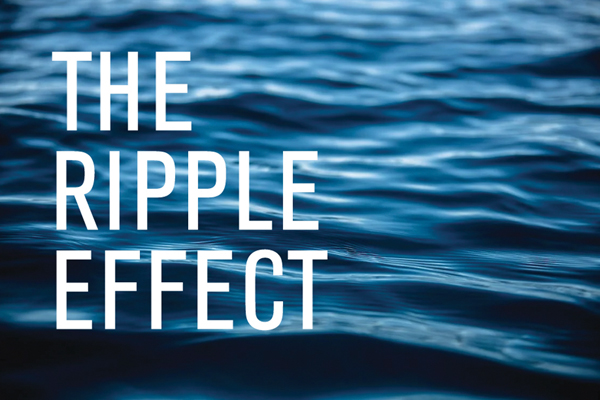The Ripple Effect

Where does it start? Where does it end? Does it end? Is it ongoing? How we act, what we say, our presence, what we do or don’t do—it has a chain reaction, or ripple effect.
Many times we will never know the impact made by a gesture, whether small or grand. Attitudes are contagious. Your smile, frown, inclusion or exclusion of participation have an effect on others, either direct or indirect.
While I am a firm believer in being responsible for your own thoughts and actions, I have witnessed and experienced the ripple effects of my own attitude towards a situation or others. I have also been on the receiving end of kindness as well as meanness. The moment you realize the impact of your words and actions to others is the moment of truth to care or not to care about the ripple effect.
“You have no idea of the countless lives you touch in the course of your lifetime.” — Sarah Ban Breathnach
Recently a client missed an appointment. They just didn’t show up. The person tending to them was affected in several ways. They left a loved one receiving an important medical treatment to keep the appointment for the client. When the client didn’t show, this affected the income of the worker and establishment, which affected the people on the wait list that were in need of services but now couldn’t get in, which could affect the attitude of the worker. There was a fee assessed for the missed appointment, which the client agreed to pay.
Then came an email with harsh words from the client who had been in a crisis situation, which they did not mention when on the phone agreeing to the missed appointment fee, and felt like they’d been treated unfairly. This is the moment of truth. You can defend your position to hold to the fee (knowing all of the just reasons to keep it), or you can understand the client’s predicament and extend grace. The ripple effect toward the client can either end the anxiety over the missed appointment and allow them to carry on with handling their situation, or add to the burden. The service provider and establishment can continue on without having a bad frame of mind over the resulting loss, knowing that compassion and care have longer-term positive ripple effects. This stops a negative attitude from spilling over into other conversations and activities later in the day.
“I alone cannot change the world, but I can cast a stone across the waters to create many ripples.”
— Mother Theresa
I was walking my dogs and happened to be deep in thought. All of a sudden I heard uproarious laughter coming from the other side of the tree line. It shopped me in my tracks, and I was immediately out of my head and caught in the moment. I realized I started to smile. Then I felt myself laughing, for no reason at all except to find joy in the fact that something made someone laugh with such gusto. It instantly reminded me of times in my life when I’ve felt such laughter. What a ripple-effect moment. That neighbor will never know they had a part in making someone else laugh. I realized it is truly that simple to contribute to cause and effect in the world.
“You think you’re just a drop in the ocean . . . but look at the ripple effect one drop can make!”
— Unknown
One of my favorite movies is Amazing Grace and Chuck. The story is about how a young boy stood for something he believed in. In this case it was to end nuclear weapons from existing, as he saw the ramifications should they ever be used. He chose to give up something he was really good at until this changed. That happened to be baseball. Someone wrote an article about it. That caught the attention of a famous basketball player, who had lost his only son. That led to them meeting and talking about this action. The parents just wanted their son back to being a normal kid who plays baseball. But the boy couldn’t be convinced to go back to life as usual without assurance that he nuclear weapons wouldn’t exist anymore. The story evolved to the point the boy stopped speaking. Then children all across the world stopped speaking. The point of sharing this is the ripple effect of just one thought taking action. This is how change happens. Being true to who you are, standing up for what you believe is right, is how others begin to take notice.
“The assumption that change has to start at the top is wrong. Start where you are.” — Jesse Lyn Stoner
